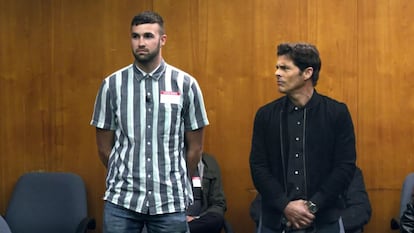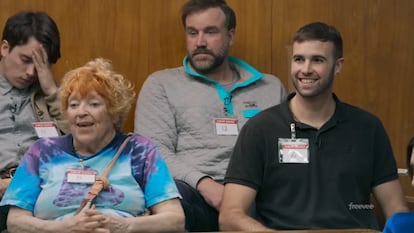A courtroom ‘Truman Show’ is the most innovative series on TV right now
‘Jury Duty’ is part mockumentary, part reality show and part exercise in improvisation

Ronald Gladden has jury duty. However, very strange things keep happening in the trial. It’s almost like he is on a reality show, he muses at one point; his fellow jurors keep quiet and remain unperturbed. Because Ronald’s feeling is right. He does not know it, but he is the protagonist of Jury Duty, one of the most innovative formats on recent American television. Available on the ad-supported streaming platform Amazon Freevee, the series, a combination of mockumentary with reality show, presents a story with a lot of scripted plot but also a lot of improvisation, as the production itself reveals in the last of its eight episodes.
Like 4,000 other people, Ronald answered an ad to be a juror in a real trial that was also going to be made into a documentary to show how a judicial process works. However, in reality he was answering a casting call for a television experiment that might be defined as a docucomedy. Everyone around him, from the other jurors to the defendant, the plaintiff, the lawyers, the judge and the court clerk, are actors. He, an ordinary man, faces crazy situations related to a trial that, to make matters worse, forces the jurors to be practically cut off from the rest of the world for three weeks, in a kind of judicial Big Brother. In the style of the movie The Truman Show, the actors, following a script that dictates the situations they must provoke, will have to improvise along the way to adapt to Ronald’s decisions and words.
The show went viral online and, thanks to word of mouth and the uniqueness of the format, attracted the attention of so many people that it became one of the surprises of the latest Emmy nominations, receiving four, including outstanding comedy series. The cast includes many experienced but little-known performers. For the lawyers and the judge, they used actors who had practiced law in the past. The best-known face of this peculiar jury is that of James Marsden (Westworld, Sonic the Hedgehog), who plays a fictional version of himself, a Hollywood star that is beyond good and evil, although hardly anyone recognizes him at first. When they meet, Ronald, with the candidness of someone who does not know that he is on television, surprises the actor by confessing that he heard that one of his latest movies is not good at all.

If the absurd situations of the show and its peculiar characters are sometimes reminiscent of The Office, it is because the creators of Jury Duty, Lee Eisenberg and Gene Stupnitsky, were writers in the popular Steve Carell comedy. One of the jurors, for instance, loves strange inventions, and one day he appears in court with a kind of chair built into his pants, which he made himself with two crutches. There is a woman who repeatedly falls asleep during the trial. Marsden is preparing a role for a movie, and he practices with his fellow jurors. From time to time, the defense attorney throws questions at his defendant that clearly go against his interests.
However, nothing in Jury Duty would work as well as it does if the protagonist — the hero, as he was referred to in the script — was not Ronald Gladden, who proves to be one of the most empathetic, kindest people in the world, helping his colleagues in unlikely situations, taking the blame for other people’s mistakes and leading a maddening trial, with a firm and understanding attitude, as jury foreman.
Shows that blur the lines between fiction and reality
Jury Duty is not the only recent series that has pushed the limits of fiction to bring them closer to reality — or vice versa. In The Rehearsal (HBO) comedian and producer Nathan Fielder explored the thesis that any decision or life experience could be practiced beforehand in order to reach that moment in life with all the variables already tested and controlled. The series begins as a quirky experiment in which Fielder helps a man practice telling his trivia teammates that he does not have the education he claimed to have when they first met. In the following episodes, the concept, which combines comedy, social experiment and psychological analysis, escalates to unexpected heights when Fielder becomes involved in the rehearsal of raising a child from infancy to adolescence. The show manages to leave a frozen, confused smile on the viewer’s face, as they ask themselves: is what I’m seeing real? Aren’t those people actually actors, really? How can we be sure that Fielder isn’t fooling us?

That level of strangeness is also often reached in How to with John Wilson (HBO) a documentary series that is on its third and final season. With Fielder himself as executive producer, the series by filmmaker John Wilson travels the streets of New York capturing stories that show the oddities, the anxiety and the uncertainty of the contemporary world, using reality, with the tools of fiction, to create unexpected stories. Ordinary life becomes poetry with everyday images assembled according to a script that is loaded with irony and surrealism, as Wilson reflects aloud. Each episode has a topic, often almost banal, as a common thread. While in past seasons there were episodes dedicated to the scaffolding in the city or the practice of covering furniture in plastic, the third installment started with two episodes focused on how to find a public toilet in New York and how to clean your ears.
Wilson’s wandering leads him to situations and people that would hardly fit into a fictional script, as they just seem too implausible. In the first episode of the third season, he makes an appointment with a man who works with septic tanks in West Texas. While they talk, the man tells him that he is preparing a house to move in with his family, built in an underground missile silo. The episode takes an unexpected turn: How does someone prepare to live underground? What does his family think about it? In the second episode, as he interviews a woman about the noise in New York, she tells him that she has met several serial killers — and one of them had been her boyfriend. With moments like these, How to with John Wilson proves that there are great stories all around us, but only a few know how to ask the right questions, or where to put the camera to find them.
Reality, fiction and comedy also go hand in hand in contents like Documentary Now!, a skit show that spoofs famous documentaries, and Cunk on Earth, where a fictional character played by comedian Diane Morgan tells the story of civilization from a humorous perspective, accompanied by interviews with real experts who answer nonsensical questions. All those are examples of how television has acquired a taste for a fusion between fiction and reality.
Sign up for our weekly newsletter to get more English-language news coverage from EL PAÍS USA Edition
Tu suscripción se está usando en otro dispositivo
¿Quieres añadir otro usuario a tu suscripción?
Si continúas leyendo en este dispositivo, no se podrá leer en el otro.
FlechaTu suscripción se está usando en otro dispositivo y solo puedes acceder a EL PAÍS desde un dispositivo a la vez.
Si quieres compartir tu cuenta, cambia tu suscripción a la modalidad Premium, así podrás añadir otro usuario. Cada uno accederá con su propia cuenta de email, lo que os permitirá personalizar vuestra experiencia en EL PAÍS.
¿Tienes una suscripción de empresa? Accede aquí para contratar más cuentas.
En el caso de no saber quién está usando tu cuenta, te recomendamos cambiar tu contraseña aquí.
Si decides continuar compartiendo tu cuenta, este mensaje se mostrará en tu dispositivo y en el de la otra persona que está usando tu cuenta de forma indefinida, afectando a tu experiencia de lectura. Puedes consultar aquí los términos y condiciones de la suscripción digital.









































